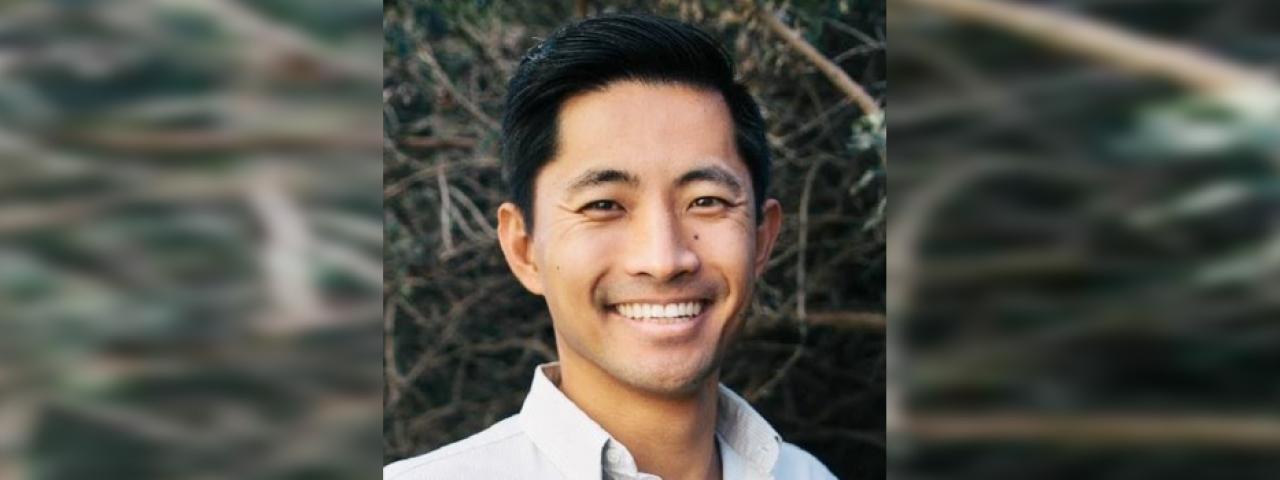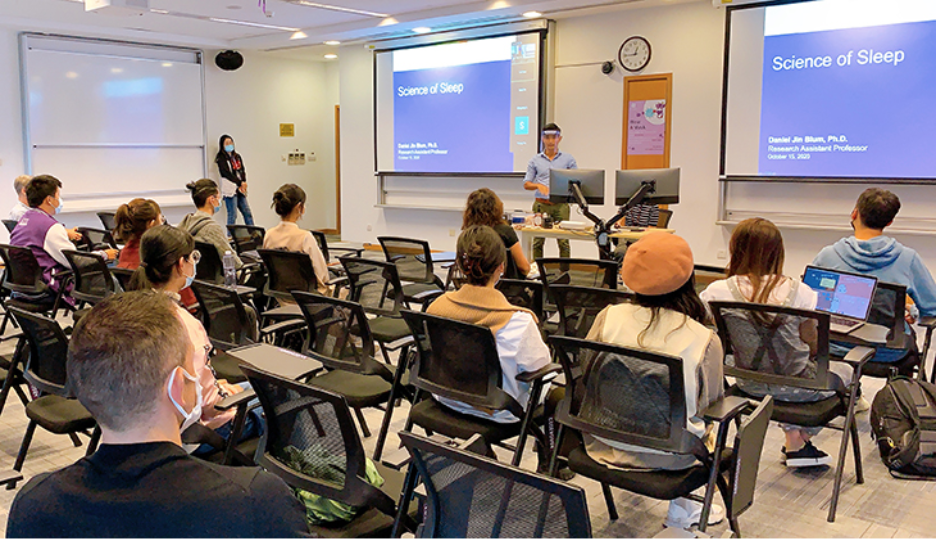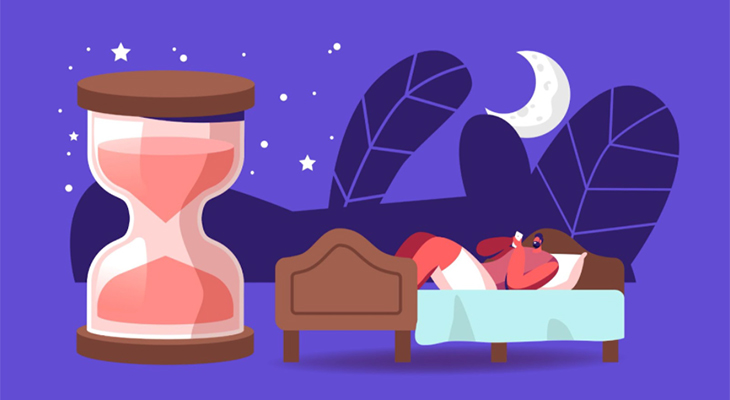
Research Assistant Professor of Psychology Daniel Jin Blum studies how our eating habits - specifically the time of day people start and stop eating - can improve sleep quality and overall health. He took a few minutes to share his latest research projects, and offer a few tips on improving our sleep habits - and beating jet lag.
What are you working on? And how did you develop your interest in this topic?
I study how eating and fasting rhythms can help people sleep better. You may have heard that getting bright light in the morning can help us sleep better. That’s because when light enters your eyes in the morning, it tells the body’s master circadian clock in the brain that it’s morning and time to be awake. This amazing biological clock tracks the 24-hour day and will send alerting signals through your body during the day and push sleep-promoting signals at night. In addition to the master clock humans have in our brain that’s reset by light, we also have a secondary master clock roughly located in the liver that’s reset by food. After a long fast, if we have a large meal, this tells the liver and the rest of the organs that it’s time to be awake and that it’s morning time. If you leverage both of those two systems at the same time, you can align the timing of all of your body’s clocks. This strengthens the sleep-promoting signals at nighttime and improves the quantity and quality of your sleep.
This has been an interest since 2016, the first time I flew from the U.S. to Asia to give a lecture. Motivated to optimize my performance, I decided to try the Jet Lag Fast. This strategy helps you beat jet lag by having you eat a large meal in the morning time of your arrival time zone and fast for 16 hours prior (usually starting your fast a few hours prior to departure). Flying from the United States to Asia is pretty hard and often takes people several days to acclimate, but by using the eating and fasting technique, I was able to acclimate to the new time zone in one day! That’s a lot of science to digest but the strategy is simple enough to try and continues to work great (also working on my dad jokes).
What brought you to Shanghai?
I’m a transnational Korean adoptee, but I didn’t do much of that discovery until I was in my thirties. Since I began that exploration in 2012, my yearly trips to Korea and Asia broadly have fostered a desire to live here for a significant amount of time. Initially, my partner Associate Arts Professor Emily Tsiang got a position at NYU Shanghai to teach design thinking. It also turns out that Shanghai is a great place for my research. In such a fast moving city, where sleep often gets pushed to the side because there's so many things to do, there’s a lot of opportunity and need to test out new techniques like eating and fasting to help people maximize performance across industries.

Professor Blum presenting on “The Importance of Sleep” at the Student Health Center’s Lunch and Learn workshop last fall.
What brought you to the field of sleep psychology?
Throughout my clinical training, I could see that sleep was a key difficulty for basically everyone but I didn't yet have any tools to really target it. However, it was during one of my first clinical placements at a juvenile detention facility where I saw the true power of sleep psychology.
There was one unit where kids were looking at life in prison. Many of them had a lot of difficulty sleeping until we started running weekly sleep groups where we would discuss basic sleep hygiene and practice relaxation exercises. The kids participating in the group soon were able to fall asleep pretty quickly, leading to better rest and calmer behavior. And as these kids started to sleep and feel better, there was a kind of blanket effect over the entire unit where the overall aggression between the other kids started to go down as well. There was such a drastic change that management requested that we provide sleep groups for every unit across the facility.
What projects do you have in the pipeline? What do you have planned for the future?
I’m involved in a few things - I’m currently finishing up a study that looks at how eating and fasting can help “night owls'' (people who have difficulty falling asleep before 1 AM) get better sleep. This past summer, Professor Brian Hall and I published a study looking at the correlation between sleep dysfunction and PTSD symptoms among domestic workers in Macau.
I am currently recruiting participants from local hospitals in Shanghai for a study examining how the eating and fasting model can help night shift workers. This is a population that we know has a lot of long-term health effects, including cardiovascular disease, metabolic issues like diabetes, all-cause mortality, and cancer.
The study will be looking to see if rapidly resetting circadian rhythms using this fasting paradigm can help shift workers fall asleep faster after a night shift, sleep more on their days off, and improve their performance during the shift. If this turns out as expected, it could provide a significant contribution to the wellbeing of 20% of the global workforce that engages in some form of shift work.

What classes do you teach and what do you hope your students will take away from them?
I’m currently teaching a core science class called, “While You Were Sleeping.” I hope through this course, my students will gain a profound appreciation for their sleep and value it for the rest of their lives. The course also includes a lab, which focuses on behavioral change around their sleep. We track their sleep, learn about the mechanisms around sleep and how to leverage those to improve sleep. A popular assignment is having the students keep a dream journal and analyze each other’s dreams! It’s my first time teaching undergrad students, and I get a lot of energy and vibrancy from our students. They’re interested in learning and they’re curious.
What are some simple tips you can give about how people can improve their sleep?
Try to eliminate bedtime procrastination. Simply putting your phone across your bedroom or outside your bedroom is a great way to get 30 more minutes of sleep per night because you’re not poking around on your phone. It’s hard, but waking up at the same time every day will set your body clocks to the same time. Try to get 7-9 hours of sleep every night, that means 7.5-9.5 hours in bed per night, minimum! Try tracking your sleep with a sleep log so you can see your sleep and then make strategic changes to it. If people want to try eating and fasting, try to do at least 12 hours of no eating minimum, every night.

